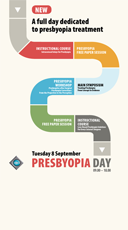Posters
(results will display both Free Papers & Poster)
Soft contact lens-related keratitis: an evaluation of patients’ compliance with safe handling, care and maintenance recommendations of contact lens wear
Poster Details
First Author: E.Kanonidou GREECE
Co Author(s): C. Kanonidou T. Lalias I. Zampros N. Lakidis L. Papazisis G. Sakkias
Abstract Details
Purpose:
Keratitis is the most serious complication of contact lens wear potentially leading to significant visual morbidity. Our purpose is to evaluate the predisposing risk factors of keratitis in contact lens wearers related to their compliance with safe handling, care and maintenance recommendations of contact lens wear.
Setting:
Department of Ophthalmology, ‘’Hippokrateion’’ General Hospital of Thessaloniki, Thessaloniki, Greece.
Methods:
43 contact lens wearers (21 male), aged 21-34 years, all university graduates, participated in our investigation. All were referred to the ophthalmology outpatient department with keratitis related to contact lens wear. All used monthly disposable hydrophilic contact lenses in order to correct an existing ammetropia for a mean duration of 3 years. The patients completed a self-administered questionnaire regarding their compliance with safe handling, care and maintenance instructions of contact lenses.
Results:
57% washed their hands before lens insertion, 69% after removal. 21% followed the rub and rinse technique after removal. 87% wore the lenses longer than recommended, 93% were not compliant with replacement schedule. 11% followed the rub and rinse technique for cleaning of contact lens case, 23% replaced it after period of three months. All were using multipurpose solution for cleaning, disinfecting and storing. All reported occasional use of saline solution or tap water to clean, disinfect and store their lenses and mentioned frequently overnight wear despite recommendations. There was significant gender difference with females being less compliant to males.
Conclusions:
It was interesting to observe the poor hand hygiene and the inadequate cleaning and disinfection patterns of lenses and storage cases followed by the participants as well as the extensive overnight wear of contact lenses despite the wearing recommendations. Health education about the potential visual loss, preventative measures and significance of compliance with safe handling, care and maintenance recommendations of contact lenses is of utmost importance.
Financial Disclosure:
NONE





